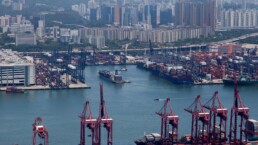Share
The informal sector is considered to be a significant aspect of the African economy and the labour market, as it plays a huge role in production, employment and income generation. The International Labour Organization (ILO) defines the informal sector as “all remunerative work (i.e. both self-employment and wage employment) that is not registered, regulated or protected by existing legal or regulatory frameworks, as well as non-remunerative work undertaken in an income-producing enterprise.
Informal workers do not have secure employment contracts, workers’ benefits, social protection or workers’ representation.” The informal economy therefore refers to economic activities that are not regulated or protected by the government and do not comply with legal or tax obligations. This includes micro, small and medium scale enterprises (MSMEs) that are not formally registered and do not keep proper records of accounts, as well as workers who lack basic social or legal protection and employment benefits.
According to the ILO, 85.8% of Africa’s employed population are in the informal sector. Informal employment in some countries in Sub-Saharan Africa accounts for over 90% of employment while informal output is as high as 62% of official GDP. This shows that the informal sector constitutes a significant portion of the economy in African countries. Given the tremendous size of the informal sector in Africa, it is safe to submit that the continent’s average tax to GDP ratio will not significantly improve until the stakeholders of this untapped sector are effectively brought into the tax net.
In West Africa, particularly in Benin and Nigeria, informal cross border trade represents approximately 75% and 20% of GDP in the respective countries. It is however quite unfortunate to see that despite the huge prospects of the informal economy, tax authorities in most African countries still find it difficult to effectively tax and regulate the informal economy. This article therefore seeks to examine the challenges of taxing the informal sector as well as the role of the African Continental Free Trade Agreement (AfCFTA) in improving informal cross border trade in Africa.
Challenges of taxing the informal sector by tax authorities
There seems to be a measure of regulatory blindness to informal trade in Africa. Generally, governments, economists and policymakers show varied reactions to the informal economy. While some argue that the informal sector is a creative ecosystem responding to inefficiencies in trade regulation, it is clear that tax authorities in African countries face various setbacks in their attempt to tax and regulate the informal sector. Majority of MSMEs maintain little or no information about their day-to-day transactions and business dealings which would have enabled them to keep accurate financial statements and compute the appropriate tax payable for the period.
Since operators in the informal economy are more focused on developing and growing their businesses as opposed to keeping proper accounting records, tax authorities find it difficult to accurately ascertain their revenue and expenses for tax purposes. In some African countries like Nigeria, tax authorities have tried using bank account transactions and receipts to tax the informal sector which expose operators in the sector to punitive tax assessments, audits and liabilities.
This approach has however been criticized as a lack of support from the government rather than a drive towards ensuring tax compliance in the country. It has been observed that the problems with taxing informal market traders in Nigeria include “a lack of tax statistics and transparency, a poor tax administration and a multiplicity of tax payments.” This situation may have potentially contributed to the low level of tax compliance and made it more challenging for the Nigerian government to bring the stakeholders of the informal economy to the tax net.
The role of the AfCFTA in improving trade in the informal sector
On 1st January 2021, African countries began officially trading under the African Continental Free Trade Agreement. The (AfCFTA) has been described as history’s largest free trade agreement, as it connects 1.3 billion people across 55 countries with a combined Gross Domestic Product (GDP) valued at $3.4 trillion.
In light of the huge potential of the AfCFTA for Africa, there is no doubt that the agreement would play a significant role in boosting trade in the informal sector which is often neglected by the government. The Agreement establishing the AfCFTA recognizes the need to improve the export capacity of both formal and informal service suppliers, with particular attention to MSMEs. The AfCFTA therefore presents a good opportunity for governments in African countries to regulate informal cross border trade on the continent for the purpose of generating revenue from the sector.
According to Afreximbank Africa Trade Report 2020, informal cross border trade in Eastern Africa is projected to worth as much as 80% of the value of formal trade. Thus, there is need for Africa to build upon existing informal trade to maximize the potential of its free trade agreement. The AfCFTA can be used as a mechanism to integrate the informal sector into the formal economy, while also addressing the challenges of the former.
The agreement can, for example, encourage the introduction of tax policies across it’s member countries that promote the formalization of the informal sector. The AfCFTA also provides the opportunity for women, who are estimated to constitute 70% of informal trade in Africa, to be well positioned to harness regional export destinations and use regional markets as means for expanding into overseas markets. Tariff reduction under the AfCFTA makes it more affordable for traders in the informal sector to carry out their operations through formal channels which are better regulated and offer more protection. This can further be enhanced by introducing a Continental Simplified Trade Regime (CSTR), since the cross border traders operating under such a regime would no longer be trading informally. Through deliberate efforts to integrate informal businesses into the larger continental trade structure, governments across countries in Africa can address the ever-present problem of taxing the informal sector.
In order to promote formalization, governments should employ strategies that aim to register informal businesses, not only for the purpose of regulating their businesses and taxing them but also to protect their rights as business owners. Since registration of businesses can be a very cumbersome task in many countries in Africa, there is the need for tax authorities to direct efforts towards simplifying tax processes and administration, as well as reducing registration fees and compliance costs in order to ease formalization of the sector. Also, it has been observed that electronic payment systems for cross border payments have the potential of cutting the security risks for traders in the informal sector and also represent an opportunity for the formalization of informal trade in Africa. In addition, incentives such as increased access to financial resources, social insurance, pension schemes, may be put in place to further motivate stakeholders in the informal economy to join the formal sector.
Conclusion
In light of the drastic economic impacts of the COVID-19 pandemic on African economies, it is clear that the formal sector is inadequate to generate sufficient revenue for governments and for improving the continent’s tax-to-GDP ratio. Accordingly, efforts must be geared towards widening the tax base and bringing more people into the tax net, particularly business owners in the informal sector.
In order to harness the full potentials of the informal sector, it is essential for tax authorities to introduce electronic payment systems, among other policies that would assist in bringing relevant stakeholders of the sector to the tax net for the purpose of improving tax revenues in African countries. With the AfCFTA, the government can boost trade in the informal sector by implementing fair and transparent policies that will benefit operators of the sector, while also addressing the numerous challenges of the economy to ease its formalization.
The views expressed in this article are those of the author and do not necessarily reflect the views of Future Africa Forum. Future Africa Forum is a pan-African policy think-tank and policy advisory consultancy headquartered in Nairobi, Kenya.



